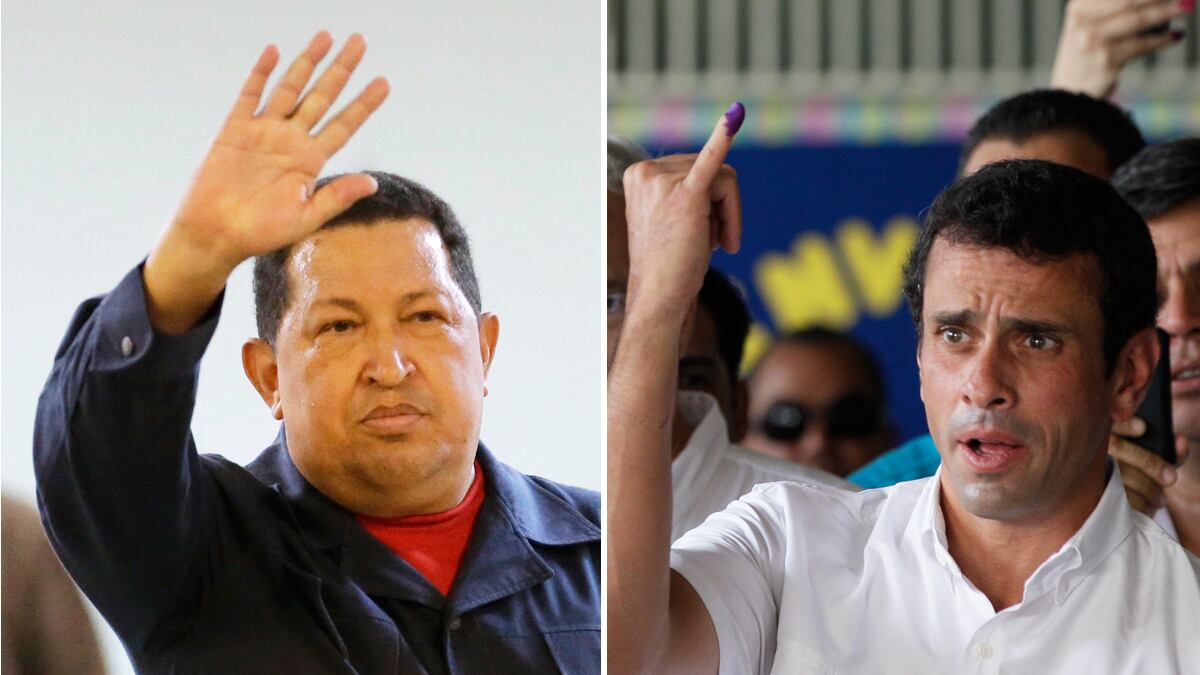Hugo Chávez has had a good year. Go figure. For months, the Venezuelan president seemed to be on the brink. After 14 bruising years in power, discontent is on the rise. Prices are soaring at close to 25 percent a year, bridges and roads are in disrepair, and the homicide rate (70 murders per every 100,000 inhabitants) is one of the worst in the Western Hemisphere. As if that were not punishment enough, Chávez’s 16-month battle with cancer has taken its toll, leaving the onetime clown prince of the campaign trail bloated and fragile. Chávez seemed ripe for an upset, and the man for the job looked to be the young, athletic governor from Miranda state, Henrique Capriles Radonski.
And yet when the electoral authority announced the election results late Sunday evening, the tally was not even close, with Chávez polling 54 percent of the ballots, 1.3 million more votes than his challenger. There are many possible explanations for Chávez’s lopsided victory, from voters who were loath to switch loyalties and risk losing their meager government assistance, to a tsunami of sympathy votes. After all, Chávez not only stood up to the gringo devil and foreign capitalists but seduced death itself. Winning, however, might have been the easy part. With yet another six-year mandate ahead of him, the real question is can the 58-year-old comandante keep fit and still push ahead with his Bolivarian revolution?
Chávez and his naysayers disagree about most things, but no one disputes that his revolution has left an impressive footprint throughout the region. In the name of Simón Bolívar, the 19th-century South American liberator whom Chávez retooled as Venezuela’s patron saint, the former Army colonel has turned his aggressive form of populism fueled by petrodollars, state capitalism, managed democracy, and anti-gringo marketing into a hemispheric franchise.
Eight nations in Latin America and the Caribbean now adhere to the Bolivarian Alliance for Our America. And Chávez has rewarded regional allies in Cuba, Nicaragua, and Bolivia with millions of barrels of cut-rate oil per year, extending his largesse to other friends in need, such as the pariah regime of Bashar al-Assad in Syria. At the same time, Venezuela has become the pole star for Hollywood celebrities, like Sean Penn, Danny Glover, and Oliver Stone, eager to lend their stardust to the Bolivarian brand.
What’s less certain is whether the good times will continue. Part accident, part conspiracy, Chávez’s socialist revolt arose out of a special set of circumstances that may be expiring. According to Moises Naím, an influential editor and former Venezuelan trade minister, those ingredients include the global boom in demand for natural resources, the emergence of a charismatic and untested leader to galvanize the masses, and later, an easy-to-loathe head of state in the most powerful nation on earth.

When Chávez was elected in 1998, he was young and brash, with a flair for crowd-pleasing soundbites; he cut a refreshing figure among Venezuela’s poor and forgotten majority. Prices for Venezuelan crude soared, decanting some $800 billion into the Bolivarian war chest over the next 13 years. Early in his first term, George W. Bush and his cowboy diplomacy rode into the White House, offering an easy target for populist potshots. “Here you had a young leader with money and no checks and balances,” says Naím.
Even as Chávez began to bend the rules, marshaling his majority to rewrite the Constitution, stack the courts and legislature, and bully adversaries, many European diplomats looked the other way, secretly pleased that someone was “poking a finger in Bush’s face, saying what they couldn’t,” says Naím.
But much has changed in 14 years. Bush has been replaced by Barack Obama, who continues to garner international prestige even as his aura has dimmed at home. Chávez is no longer a fresh face, much less the energetic everyman who once enchanted the masses. Though he claims to have beaten cancer and silenced rumors that he was on his death bed, it is far from clear whether he will be able to complete another mandate that would keep him in office till 2019. He presides over a nation that has never been more divided.
Signs of trouble already abound. In a recent report on the Venezuelan economy, Goldman Sachs warned about the cost of Chávez’s “fiscal activism” in the run-up to the election, which pumped up public spending (the money supply is up by nearly 60 percent in the last year), pushed inflation over 20 percent a year, and sapped growth. And while the poor have benefited from social programs, they have paid dearly at the supermarket, where prices have surged, and in peace of mind, as violent crime has spiked.
Chávez’s top-heavy politics are part of the problem. Take oil. After a massive strike in 2002 and 2003, Chávez stuffed the state oil company, PDVSA, with government loyalists and regularly raided it to fund social programs to select constituencies. The result: production has fallen to a 10-year low of 2.5 million barrels a day, even as world oil prices have surged. At the same time, crucial investments have faltered, including for upkeep. According to PDVSA’s own books, the company had twice canceled scheduled maintenance work on the huge Amuay oil refinery, which exploded in August, killing 39 people.
Now Chávez’s allies, too, are learning the limits of the Bolivarian playbook. Consider Bolivian President Evo Morales. After repeatedly criticizing U.S. antidrug policy in the region, Morales fell out of favor with Washington, forfeiting Bolivia’s claim to $600 million in American foreign aid through the Millennium Challenge Corp.
Takeovers of foreign companies and government intervention in the markets have spooked investors, hollowing out key industries. Nor is Venezuela a reliable surrogate for foreign capital. After losing preferential trade status with the U.S., the Morales government seized the country’s largest textile mill, Ametex, and turned to Venezuela for help. Little came of the deal, and now the company that once sold to Polo Ralph Lauren and Abercrombie & Fitch is facing massive layoffs.
Now U.S. industry groups are calling on Washington to strip Ecuador, another partner in the Chávez alliance, of the trade perks the Andean nation enjoys in exchange for combating drug trafficking. The general counsel for the U.S. Trade Representative seconded the move as a response to Quito’s “lack of regard for due process and the rights of U.S. persons who have invested in Ecuador.”
Until recently, with global demand soaring for oil, gas, and minerals, thumping the tub against imperialism played well at home. And when the going got tough, Chávez was there, pumping vital aid and hope throughout the Bolivarian archipelago. For the first time since Chávez launched his revolution, however, that largesse can no longer be taken for granted. In part, that is what has fueled disquiet, emboldened the historically dysfunctional political opposition, and curbed the spending power of populist allies. Cristina Fernández de Kirchner of Argentina, Morales of Bolivia, and Ecuador’s Rafael Correa are already feeling the popular backlash.
The revolution is hardly running on empty, as Chávez’s victory at the polls suggests. And as long as oil is flowing, Chávez will continue to the pump the Bolivarian dream across the hemisphere. But neither his war chest nor the indulgence of voters is infinitely reliable. “The cycle of populism fueled by oil revenues has not yet played itself out,” says Bolivian economist Roberto Laserna. “But the waste of resources and loss of opportunities are getting harder to ignore.”





